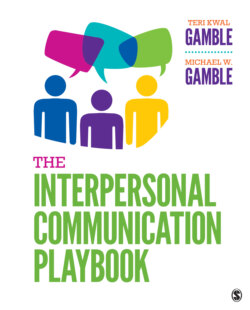Читать книгу The Interpersonal Communication Playbook - Teri Kwal Gamble - Страница 60
На сайте Литреса книга снята с продажи.
Interact Ethically, Respect Diversity, and Think Critically
ОглавлениеEffective interpersonal communicators act ethically in their relationships, demonstrate their respect for diversity, and think critically about the interactions they share. Ethical communicators demonstrate the ability to adhere to standards of right and wrong. They follow appropriate interaction rules, treat other people as they would like to be treated, and never knowingly harm someone else in an effort to achieve personal goals.
Interpersonal communicators who respect diversity understand culture’s role in person-to-person interactions, tolerate difference and dissent, willingly interact with people from a variety of backgrounds, demonstrate a decreased use of stereotypes to guide behavior, process experience from the viewpoints of others, avoid imposing their cultural values on other people, and refrain from holding discriminatory attitudes.
Individuals who think critically about their relationships know that communication is complex, and they don’t know all there is to know. They are open-minded; reflect on others’ ideas rather than respond impulsively; open themselves to new ideas and new ways of perceiving; challenge themselves to reexamine their beliefs, values, and behaviors; and concern themselves with unstated assumptions in addition to overt discourse. They think things out, analyzing and evaluating outcomes, seeking to understand and remember what worked or didn’t, and creating opportunities for their own personal growth together with the personal growth of others.
Reflect on This: The Cell Effect
Over a decade ago, researcher Noelle Chesley wanted to find out if the time people spent on cellphones enhanced or detracted from their overall feelings of happiness. To answer the question, Chesley surveyed more than 1,200 adults and concluded that a correlation existed: The more time individuals spent on cellphones, the less happy and less satisfied they became with their family relationships. Chesley attributed this, at least in part, to the work lives of people spilling over into their personal lives and causing stress at home.
